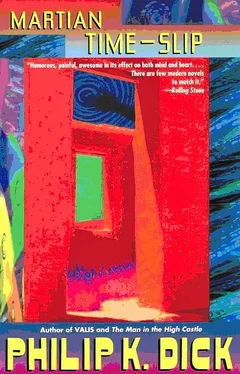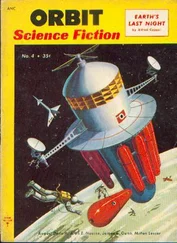“Don’t worry,” Arnie said encouragingly. “There’s nothing here to be scared of.” Was the boy’s talent already blending with that of the rock? And, he wondered, had the rock itself become apprehensive, too? Was it capable of that?
The trail leveled out and became wider. And all was in shadow; cold and damp hung over everything, as if they were treading within a great tomb. The vegetation that grew thin and noxious along the surface of rocks had a dead quality to it, as if something had poisoned it in its act of growing. Ahead lay a dead bird on the path, a rotten corpse that might have been there for weeks; he could not tell. It had a mummified appearance.
I sure don’t enjoy this place, Arnie said to himself.
Halting at the bird, Manfred bent down and said, “Gubbish.”
“Yeah,” Arnie murmured. “Come on, let’s go.”
They arrived all at once at the base of the rock.
Wind rustled the leaves of vegetation, the shrubs which looked as if they had been skinned down to their elements: bare and picked over, like bones stuck upright in the soil. The wind emerged from a crack in Dirty Knobby and it smelled, he thought, as if some sort of animal lived there. Maybe the priest himself; he saw with no real surprise an empty wine bottle lying off to one side, with other bits of debris caught on the sharp foliage nearby.
“Anybody around?” Arnie called.
After a long time an old man, a Bleekman, gray as if wrapped in webs, edged out of the chamber within the rock. The wind seemed to blow him along, so that he crept sideways, pausing against the side of the cavity and then stirring forward once more. His eyes were red-rimmed.
“You old drunk,” Arnie said in a low voice. And then from a piece of paper Helio had given him he greeted the old man in Bleeky.
The priest mumbled a toothless, mechanical response.
“Here.” Arnie held out a carton of cigarettes. The priest, mumbling, sidled forward and took the carton in his claws; he tucked the carton beneath his gray-webbed robes. “You like that, huh?” Arnie said. “I thought you would.”
From the piece of paper he read, in Bleeky, the purpose of his visit and what he wanted the priest to do. He wanted the priest to leave him and Manfred in peace for an hour or so, at the chamber, so that they could summon the spirit of the rock.
Still mumbling, the priest backed away, fussed with the hem of his robes, then turned and shambled off. He disappeared down a side trail without a backward look at Arnie and Manfred.
Arnie turned the paper over and read the instructions that Helio had written out.
(1)Enter chamber.
Taking Manfred by the arm, he led him step by step into the dark cleft of the rock; flashing on his light, he led the boy along until the chamber became large. It still smelled bad, he thought, as if it had been kept closed up for centuries. Like an old box full of decayed rags, a vegetable rather than animal scent.
Now what? Again he consulted Helio’s paper.
(2)Light fire.
An uneven ring of boulders surrounded a blackened pit in which lay fragments of wood and what appeared to be bones. . . . It looked as if the old wino fixed his meals here.
In his pack Arnie had kindling; he got it out now, laying the pack on the floor of the cavern and fumbling stiff-fingered with the straps. “Don’t get lost, kid,” he said to Manfred. I wonder if we’re ever coming out of here again? he asked himself.
Both of them felt better, however, when the fire had been lit. The cavern became warmer, but not dry; the smell of mold persisted and even seemed to become stronger, as if the fire were attracting it, whatever it was.
The next instruction bewildered him; it did not seem to fit in, but nonetheless he complied.
(3)Turn on portable radio to 574 kc.
Arnie got out the little Japanese-made transistor portable and turned it on. At 574 kc. nothing but static issued forth. It seemed, though, to obtain a response from the rock around them; the rock seemed to change and become more alert, as if the noise from the radio had awakened it to their presence. The next instruction was equally annoying.
(4)Take Nembutal (boy not take).
Using the canteen, Arnie swallowed the Nembutal down, wondering if its purpose was to blur his senses and make him credulous. Or was it to stifle his anxiety?
Only one instruction remained.
(5)Throw enclosed packet on fire.
Helio had put into Arnie’s pack a small paper, a waddedup page from the New York Times , with some kind of grass within it. Kneeling by the fire, Arnie carefully unwrapped the packet and dumped the dark, dry strands into the flames. A nauseating smell arose and the flames died down. Smoke billowed out, filling the chamber; he heard Manfred cough. Goddamn, Arnie thought, it’ll kill us yet if we keep on.
The smoke disappeared almost at once. The cavern seemed now dark and empty and much larger than before, as if the rock around them had receded. He felt, all at once, as if he were going to fall; he seemed no longer to be standing precisely upright. Sense of balance gone, he realized. Nothing to use as bearing.
“Manfred,” he said, “now listen. On account of me you don’t have to worry about that AM-WEB anymore, like Helio explained. You got that? O.K. Now regress back around three weeks. Can you do that? Really put your back into it, try hard as you can.”
In the gloom the boy peeped at him, eyes wide with fear.
“Back to before I knew Jack Bohlen,” Arnie said. “Before I met him out on the desert that day those Bleekmen were dying of thirst. You get it?” He walked toward the boy--
He fell flat on his face.
The Nembutal, he thought. Better get back up before I pass out entirely. He struggled up, groping for something to catch on to. Light flared, searing him; he put his hands . . . and then he was in water. Warm water poured over him, over his face; he spluttered, choked, saw around him billowing steam, felt beneath his feet familiar tile.
He was in his steam bath.
Voices of men conversing. Eddy’s voice, saying, “Right, Arnie.” Then the outline of shapes around him, other men taking showers.
Down inside him, near his groin, his duodenal ulcer began to burn and he realized that he was terribly hungry. He stepped from the shower and with weak, unwilling legs padded across the warm, wet tiles, searching for the attendant so that he could get his great terrycloth bath towel.
I been here before, he thought. I’ve done all this, said what I’m going to say; it’s uncanny. What do they call it? French word . . .
Better get some breakfast. His stomach rumbled and the ulcer pain increased.
“Hey, Tom,” he called to the attendant. “Dry me off and get me dressed so I can go eat; my ulcer’s killing me.” He had never felt such pain from it before.
“Right, Arnie,” the attendant said, stepping toward him, holding out the huge soft white towel.
When he had been dressed by the attendant, in his gray flannel trousers and T-shirt, soft leather boots, and nautical cap, Goodmember Arnie Kott left the steam bath and crossed the corridor of the Union Hall to his dining room, where Heliogabalus had his breakfast waiting.
At last he sat before a stack of hotcakes and bacon, genuine Home coffee, a glass of orange juice from New Israel oranges, and the previous week’s New York Times , the Sunday edition.
He trembled with consternation as he reached to pick up the glass of chilled, strained, sweet orange juice; the glass was slippery and smooth to the touch and almost eluded him in mid-trip. . . . He thought, I have to be careful, slow down and take it easy. It’s really so; I’m back here where I was, several weeks ago. Manfred and the rock of the Bleekmen did it together . Wow, he thought, his mind a hubbub of anticipation. This is something! He sipped at the orange juice, enjoying each swallow of it until the glass had been emptied.
Читать дальше









